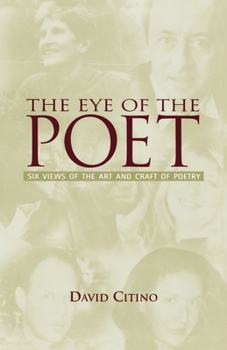The Eye of the Poet: Six Views of the Art and Craft of Poetry
Select Format
Select Condition 
Book Overview
Featuring contributions from widely published and practicing poets who are also experienced teachers and presenters of poetry, The Eye of the Poet: Six Views of the Art and Craft of Poetry provides students and other readers with invaluable practical advice. Ideal for courses in poetry writing and creative writing, it includes six sections written by Billy Collins, Carol Muske, David Baker and Ann Townsend, Yusef Komunyakaa, Maxine Kumin, and David Citino. These poets speak their minds about their relationship with their art and craft, offering guidance to writers at all levels of experience from the beginner to the veteran.
In his section, Billy Collins looks at the ways reading and writing poetry give readers pleasure, while Carol Muske's essay examines the question, "What is a poem?" David Baker and Ann Townsend discuss the formal and musical aspects of composing and reading poems; they include many engaging exercises and directions to further reading. Yusef Komunyakaa enrolls readers in a virtual poetry workshop, Maxine Kumin considers the necessities and demands of audience, and David Citino talks about the roles that poets play as they conceive and execute their work. In their essays, the contributors include examples of poems--written by themselves or others--to illustrate key points. While the chapters are meant to be self-contained explorations, they are also interrelated parts of the volume as a whole. The Eye of the Poet is a stimulating conversation in which successful poets share with readers their enthusiasm, knowledge, and vision, as well as their estimation of the possibilities of the poem. In this book, students of poetry will discover the wide variety of options available to them when they sit down to create their own works.
In his section, Billy Collins looks at the ways reading and writing poetry give readers pleasure, while Carol Muske's essay examines the question, "What is a poem?" David Baker and Ann Townsend discuss the formal and musical aspects of composing and reading poems; they include many engaging exercises and directions to further reading. Yusef Komunyakaa enrolls readers in a virtual poetry workshop, Maxine Kumin considers the necessities and demands of audience, and David Citino talks about the roles that poets play as they conceive and execute their work. In their essays, the contributors include examples of poems--written by themselves or others--to illustrate key points. While the chapters are meant to be self-contained explorations, they are also interrelated parts of the volume as a whole. The Eye of the Poet is a stimulating conversation in which successful poets share with readers their enthusiasm, knowledge, and vision, as well as their estimation of the possibilities of the poem. In this book, students of poetry will discover the wide variety of options available to them when they sit down to create their own works.
Format:Paperback
Language:English
ISBN:0195132556
ISBN13:9780195132557
Release Date:June 2001
Publisher:Oxford University Press
Length:224 Pages
Weight:0.61 lbs.
Dimensions:0.5" x 5.5" x 8.5"
Customer Reviews
1 rating
The Aye of the Poet too
Published by Thriftbooks.com User , 14 years ago
These are essays on the craft, process, and thinking of poetry. It's the sort of book that's easy to carry and worth carrying because when you sit down to read it you're happy you have it. There are six essays by seven authors. Two essays are outstanding. The first is by Billy Collins, not really my type of poet in the large picture, but he's accessible, which I think is the goal of the book. He pursues the question of what happens to us when we read a poem and he approaches the possible answers from a variety of points touching on the someplace else-ness of a poem or the way it asks readers to slow down. For me the most memorable essay was by Yusef Komunyakaa and I marked quite a few passages that I will reconsider as I continue writing and planning future classes. I suggest getting a copy, for these two essays alone. However, if you take my recommendation, don't get mad if you find a pedantic essay about meter (that I felt was better presented in other books)or other less than compelling pieces. That said, I think what Citino has done is admirable because we can never have too many books where poets speak to their processes and passions.






